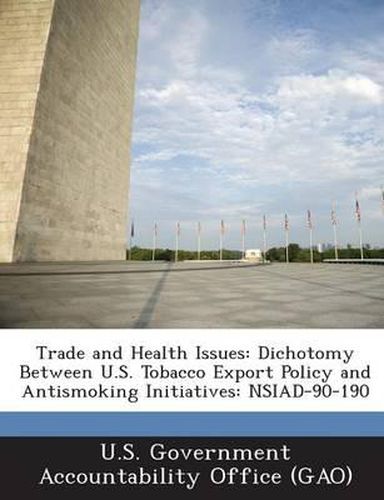Readings Newsletter
Become a Readings Member to make your shopping experience even easier.
Sign in or sign up for free!
You’re not far away from qualifying for FREE standard shipping within Australia
You’ve qualified for FREE standard shipping within Australia
The cart is loading…






Pursuant to a congressional request, GAO reviewed: (1) the U.S. government’s role in assisting the export of tobacco and tobacco products; and (2) the health implications of tobacco exporting activities. GAO found that: (1) U.S. cigarette companies faced foreign-imposed trade barriers in marketing tobacco, and the U.S. government provided assistance in removing those barriers; (2) in 1989, the U.S. tobacco trade surplus doubled, to $4.3 billion; (3) U.S. tobacco growers greatly benefited from the cigarette export increase; (4) there were few incidents where U.S. companies violated cigarette trade agreements and industry codes; (5) over the past 25 years, Congress has enacted a number of laws concerning the health hazards of cigarettes; (6) the Overseas Private Investment Corporation denied assistance to U.S. cigarette companies wishing to promote tobacco use overseas, because of smoking health hazards; (7) the U.S. did not consider removing tobacco trade barriers during recent trade negotiations with four Asian countries, and there seemed to be no long-term adverse implications for U.S. relations with those countries; (8) the prevalence of smoking in Japan, Taiwan and South Korea was higher than in the United States, resulting in the establishment of anti-smoking movements in those countries; (9) while the smoking rate in Japan had declined, cigarette consumption in Taiwan and South Korea had increased since the removal of U.S. cigarette export barriers; and (10) the opening of Asian cigarette markets, cigarette advertising, and changing socioeconomic factors contributed to increased cigarette use in certain Asian countries.
$9.00 standard shipping within Australia
FREE standard shipping within Australia for orders over $100.00
Express & International shipping calculated at checkout
Pursuant to a congressional request, GAO reviewed: (1) the U.S. government’s role in assisting the export of tobacco and tobacco products; and (2) the health implications of tobacco exporting activities. GAO found that: (1) U.S. cigarette companies faced foreign-imposed trade barriers in marketing tobacco, and the U.S. government provided assistance in removing those barriers; (2) in 1989, the U.S. tobacco trade surplus doubled, to $4.3 billion; (3) U.S. tobacco growers greatly benefited from the cigarette export increase; (4) there were few incidents where U.S. companies violated cigarette trade agreements and industry codes; (5) over the past 25 years, Congress has enacted a number of laws concerning the health hazards of cigarettes; (6) the Overseas Private Investment Corporation denied assistance to U.S. cigarette companies wishing to promote tobacco use overseas, because of smoking health hazards; (7) the U.S. did not consider removing tobacco trade barriers during recent trade negotiations with four Asian countries, and there seemed to be no long-term adverse implications for U.S. relations with those countries; (8) the prevalence of smoking in Japan, Taiwan and South Korea was higher than in the United States, resulting in the establishment of anti-smoking movements in those countries; (9) while the smoking rate in Japan had declined, cigarette consumption in Taiwan and South Korea had increased since the removal of U.S. cigarette export barriers; and (10) the opening of Asian cigarette markets, cigarette advertising, and changing socioeconomic factors contributed to increased cigarette use in certain Asian countries.